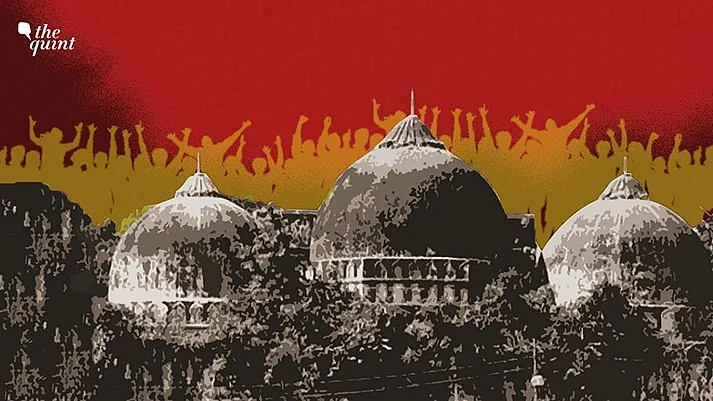Five petitions were filed in the Supreme Court on Friday, 6 December, seeking review of its 9 November verdict which cleared the way for construction of a Ram Temple at the disputed site in Ayodhya.
A five-judge bench, headed by the then-chief justice Ranjan Gogoi, had in a unanimous verdict on 9 November decreed the entire 2.77 acre disputed land in favour of deity 'Ram Lalla' and also directed the Centre to allot a five-acre plot to Sunni Waqf Board for building a mosque in Ayodhya.
The petitions have been filed by Mufti Hasbullah, Moulana Mahfoozur Rehman, Mr Misbahuddin, Mohammad Umar and Haji Nahboob, who are supported by the All India Muslim Personal Law Board (AIMPLB).
‘Verdict Condones Serious Illegalities of Destruction, Criminal Trespass’
In a press release, the five review petitioners through their counsel MR Shamshad, said that AIMPLB had decided on 17 November that it would support filing of review pleas in the matter.
In his review plea, Maulana Mufti Hasbullah has said that the top court should reconsider the “grave injustice” to the community in a title suit.
“Title could not have been given to Hindu parties on the basis of exclusive possession of entire site which never existed at any point in time with the Hindus since it is admitted that Muslims entered and prayed at the site till December 1949, and later prevented from doing so because of the attachment while unfairly permitting Hindu worship following criminal trespass,” Hasbullah said in his plea, which has been settled by senior advocates Rajeev Dhavan and Zafaryab Jilani.
The plea said that the 9 November verdict “condones serious illegalities of destruction, criminal trespass and violation of rule of law including damaging the Mosque and eventually destroying it.”
‘Error’ in Deciding Land’s Possession
Hasbullah added in his plea, “The judgment erred in accepting the juristic personality of the idol entitled it to the three-domed structure and the courtyard while holding that the idol was illegally and forcibly put there. An idol as deity cannot be simultaneously illegally placed and legally valid to claim the title,” Hasbullah said in his plea.
It said that since it is undisputed that Muslims were praying on the site till 16 December 1949 and entered the mosque through the outer courtyard, this fact proves that the Hindus were never in exclusive possession.
“The court erred in not considering that there was a dedication of the mosque which was self-evident from the inscriptions. The judgment erred in holding that the waqf was not established by ‘user’ though continuous possession and prayer were shown at all times,” the plea added.
“It also wrongly assumed that prayers did not take place at mosque before 1857 but used 1857 onwards alone as relevant,” one of the review petitions said.
It further said, “the judgment under review erred in allotting alternate land of 5 acres to the Sunni Waqf Board under Article 142 even though the same was not pleaded for.”
One of the grounds for the review also relates to the fact that the de jure effect of the direction in the 9 November Ayodhya verdict is to destroy the mosque if it still existed. It means that giving antecedent title to the Hindus, means that the site belonged to them in 1992. It thus states that had the mosque not been destroyed in 1992, the judgement would have ordered it to be destroyed.
Meanwhile, another party has also filed a review petition in the case. Mohammed Ayub, President of Peace Party told ANI, “The verdict was delivered on the basis of agreement/settlement and not evidences.”
Who Filed the First Review Petition?
On 2 December, the first review petition in the case was filed by Maulana Syed Ashhad Rashidi, legal heir of original litigant M Siddiq and Uttar Pradesh President of Jamiat Ulama-e-Hind saying that “complete justice” could only be done by directing reconstruction of Babri Masjid.
While key litigant, Uttar Pradesh Sunni Central Wakf Board, decided against challenging the verdict, Rashidi has sought review of the verdict on 14 counts.
In the first review plea, Rashidi has sought an interim stay on operation of the verdict in which it had directed the Centre that a trust be formed within three months for construction of the temple at the site.
Rashidi has also questioned the direction asking the Centre and the Uttar Pradesh government to allot 5 acre land for construction of a mosque at a prominent place in Ayodhya, saying that such a prayer was never made by the Muslim parties.
(With inputs from PTI, ANI)
